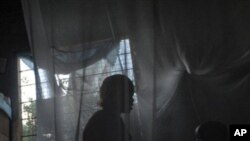Sierra Leone launches a $23 million anti-malaria campaign Thursday, aiming to get treated mosquito nets into every household in the country.
Nicknamed the "White Man's Grave" in the nineteenth century by British colonials because of the high death rates from malaria, Sierra Leone has a long history with the mosquito-borne disease.
Today malaria is still the country's biggest health concern. It is the leading cause of death and disease and your average Sierra Leonean is likely to suffer three to four bouts of the debilitating disease a year.
Now the country aims to reduce malaria cases by up to 40 percent thanks to a campaign that will see every household in the country receive insecticide-treated mosquito nets.
Lianne Kuppens is head of child survival and development at the United Nation's Childrens Fund in Sierra Leone. UNICEF is coordinating the campaign in collaboration with Sierra Leone's Ministry of Health and other partners. She says this campaign is the first of its kind in Sierra Leone.
"It means that we aim for two bed nets per household. That was how we estimated," Kuppens said. "We have roughly 6 million people and we have 3.2 million bed nets already in the country as we speak. So it's the first time ever that we are going for universal coverage of bed nets."
High hopes
The campaign is funded largely by the World Bank, Britain's Department for International Development and the Red Cross and Red Crescent Federation.
With health teams going from house to house, the campaign hopes to reach even the most far-flung residents. In Sierra Leone, where road networks are poor, this is no small task. The Ministry of Health has enlisted the help of the army to distribute nets.
Bed nets are widely considered the best approach to malaria prevention, especially in low-income countries where poor environmental sanitation often provides ample breeding sites for the mosquito.
One treated mosquito net costs about $6 and lasts up to five years. If the nets are used properly, they can cut the number of malaria cases in half.
Misuse of nets
But in a country where two thirds of the population lives below the poverty line, creative enterprise is second nature. Free mosquito nets often find their way into the marketplace or are used as fishing nets or shower scrubs. Vegetable growers use mosquito nets to protect cabbages and carrots from harmful bugs.
Kuppens says this campaign is about more than just distributing mosquito nets. It plans to change the way people use them.
"We want people to use the bed nets. Unfortunately we have in Sierra Leone roughly, well the figure is below 25 percent of the children do sleep under a bed net," Kuppens said. "So there is a tremendous task to do with regard to behavior change, that we ensure that people really do sleep under the bed nets."
A few weeks after distribution, a "Hang Up" campaign will encourage people to literally hang up their new nets over their beds. Health volunteers will again go house to house. But this time with a hammer and nail, to make sure nets are hung properly.
Street theatre, community radio and religious leaders will all help convince people that hanging their nets over their beds is better in the long run than selling them or catching fish with them.
The campaign is part of Sierra Leone's Mother and Child Health Week, which will administer Vitamin A and de-worming medication to all children under five years old. And, with the resurgence of polio cases in the region, health teams will also benefit from the campaign to administer the polio vaccine.
Sierra Leone Launches Nationwide Malaria Campaign
- By Diaa Bekheet





